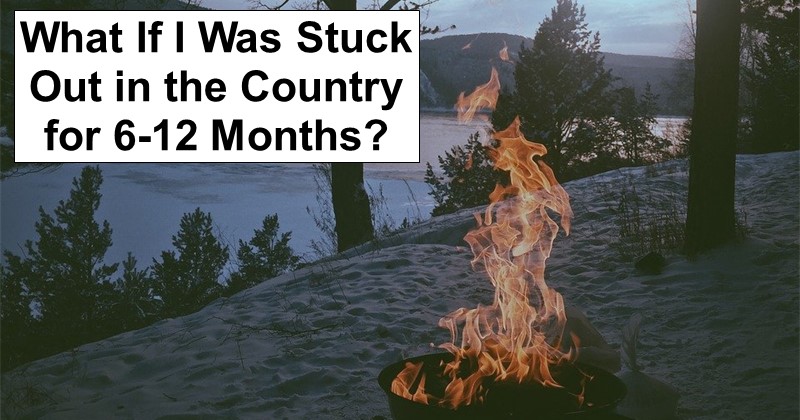Question: What if I was stuck out in the country and needed at least 6 to 12 month’s supply of necessities? I have a torch, spare batteries, shampoo, deodorant and soap for starters. But what about the full range of all products and their longevity etc. for this sort of situation? Many Thanks for your time.
My Answer:
So, basically you’re asking how to be self-sufficient for six to twelve months of time. Assuming that you’re out in the country with the intent of staying away from the mayhem, then it’s not entirely too difficult to prepare yourself for several months. If, on the other hand, you happen to be stuck out in the country with no preparations then that’s an entirely different problem. I’ll assume it’s the former. I’ll also assume you have a place to stay, like a cabin in the woods or whatnot.
To answer your question about “the full range of products and their longevity,” I would say that most supplies (unless they’re exposed to extreme heat or water, for example) should last for years without worry. Most personal hygiene supplies and cans of food should be fine. Batteries should last for several years. Clothing and shoes, if taken care of, will last years. Even fuels will last a long time if treated properly; fuel stabilizers like Stabil or PRI-G/PRI-D will help keep gasoline and diesel (or kerosene) from deteriorating. Vitamins and herbs in pill form should be fine too.
Really, it’s going to be about taking the time and spending the money to stock up on all of the supplies you’re going to need to see you through. I’m sure an hour or two of your time and a walk through of your home will help you determine precisely what you should need. About the only thing I can think of which may be problematic are prescription medications. You can talk to your doctor about your concerns and try to get lengthier prescriptions or even refills, but sometimes even pharmacies or insurance companies won’t fill unusual dosages for a variety of reasons. It’s a problem to be sure. Just be honest and keep trying or, if all else fails, look for a new doctor or pharmacy.
What’s really going to take effort is ensuring you have your basic needs taken care of. That is, do you have a way to collect, store, and treat water on an ongoing basis? Is that going to be rainwater, a nearby river, a well? I don’t know your situation, but you really need to figure this one out because almost nothing happens without a good source of clean, renewable water. Everything from drinking to cooking and cleaning relies on it. What about a way to cook food or boil water? Creating a campfire is ok sometimes but, to be honest, it’s not ideal for months on end. Have a way to cook food and boil water that’s not entirely reliant on manmade fuels (e.g. propane stoves), most likely some sort of wood-burning stove. And, of course, you’ll need to be able to procure more firewood which means you’ll need the tools to do so.
Remember, too, that you’re going to need to keep warm in the winter. Do you have the proper attire to stay warm when doing work outside? Do you have a good quality sleeping bag? Do you have a wood stove? Aside from this, about the only other major concern is the ability to keep food refrigerated. A small solar system (e.g., solar panels, charge controller, batteries) and an efficient mini fridge should do the trick, but none of it is cheap. That said, it’s not a requirement to have refrigeration or even power, but I’d say most of us have learned to rely on electricity for a multitude of reasons, even if that’s for doing nothing more than to keep the lights on at night. You’ll have to decide how important it is for you.
No doubt this conversation could go on and on. After all, we haven’t discussed anything at all about sanitation needs (e.g., a place to go to the bathroom), security or defense considerations, or first aid and medical concerns, to name a few topics I haven’t addressed here. I would suggest that if this is really something you’re looking to do then start with the basic survival needs (water, food, shelter/warmth), stock on the supplies you know you’ll need (e.g., personal hygiene supplies, medications, cleaners, fuel, batteries, etc.), then move on to dealing with everything else as money and time permit (e.g., solar and refrigeration).
Granted, there’s no harm in putting together a standard first aid kit while you’re at it; buying one online may be tempting, but they’re not always the best. As an example of something worthwhile, I would suggest you look at kits created by people who are both preppers and doctors, specifically Dr. Alton and his wife at doomandbloom.net. This will at least give you an idea of what to look for when purchasing a first aid kit.

Leave a Reply